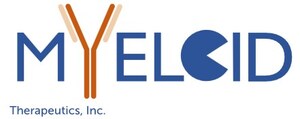- MT-303 is Myeloid's second clinical in vivo mRNA CAR program; it incorporates proprietary next-generation mRNA innovations -
- MT-303 programs immune cells directly in patients; the first time an in vivo CAR has been evaluated in HCC -
CAMBRIDGE, Mass., July 31, 2024 /PRNewswire/ -- Myeloid Therapeutics, Inc. ("Myeloid"), a clinical-stage immunology company advancing RNA therapeutics to conquer cancer, has dosed the first patient with MT-303 in a Phase 1 study for hepatocellular carcinoma (HCC). MT-303 is Myeloid's second in vivo mRNA CAR program to enter the clinic from its pipeline of in vivo immune cell programming therapies. Dosing with MT-303 represents a significant milestone to bring advanced novel therapies to people with liver cancer.
Dr. Matthew Maurer, Chief Medical Officer of Myeloid, commented, "We are thrilled to have swiftly advanced MT-303 into the clinic as the first in vivo CAR therapy applicable to the majority of liver cancers, and other cancers expressing GPC3. MT-303 can be administered like any other off-the-shelf intravenous therapy, without the need for pretreatment conditioning, and offers the potential to trigger a coordinated immune response against the cancer, reinforced and maintained with ongoing repeat dosing."
GPC3 is a target of significant global interest given its high expression in HCC and limited expression in normal tissues. Unlike autologous cell therapies, Myeloid's approach focuses on in vivo programming of immune cells with off-the-shelf mRNA-encoded CAR technology that expresses selectively within myeloid cells. MT-303 arms myeloid cells with a proprietary chimeric antigen receptor that enables these cells to kill hepatocellular carcinoma and to engage an adaptive immune response against the tumor. This coordinated immune response is essential to foster a sustained immune surveillance and defense against tumor recurrence.
Dr. Timothy Humphries, Linear Clinical Research, lead principal investigator on the MT-303 trial added, "Hepatocellular carcinoma is a highly lethal cancer with limited effective therapies. I am elated to bring the option and potential of MT-303, the first in vivo CAR therapy for this disease, to my patients with the hope of providing tolerable and durable clinical benefit."
"The Myeloid team continues to push forward and revolutionize cancer treatment with the world's first clinical-stage in vivo mRNA CAR therapies," said Daniel Getts, Ph.D., CEO of Myeloid. "With multiple clinical trials ongoing that evaluate our therapeutic candidates, including MT-302, our novel TROP2-targeting mRNA CAR in dose escalation studies, and adding MT-303, we have a proven ability to translate cutting-edge mRNA CAR technology into clinical candidates. We are excited by the transformative potential of our in vivo immune cell programming for liver cancer patients."
Dr. Getts continued, "Strategically, these clinical programs provide insights as we continue to expand our development portfolio to other targets, to other immune cell types, and to novel receptor combinations for our in vivo CAR approaches."
Myeloid's in vivo programming candidates are designed with proprietary insights to deliver personalized therapy, providing benefits to patients while reducing time and costs through the elimination of ex vivo handling of patient cells and complex neoantigen sequencing. The Myeloid platform integrates validated antibody/antigen binding with novel combinations of myeloid signaling domains, coded within a simple mRNA that can be delivered repeatedly using lipid nanoparticles (LNPs). The platform's versatility provides a range of signaling domains and immune cell types useful for combination approaches.
About Liver Cancer
With limited treatment options, and over 850,000 new cases diagnosed globally each year, liver cancer has become the third leading cause of cancer death. After initial treatment success with small molecule therapies, the development of new treatment approaches in the field of liver cancer has been limited. Today, patients with liver cancer who are refractory to first line treatment are left with few treatment options, creating a substantial unmet medical need. Myeloid sees an opportunity to make a significant contribution to address this need, by providing a new CAR for these patients who are living with liver cancer. The CARs are capable of providing a coordinated and durable immune response to counter advanced disease. The CARs are combinable and will expand the treatment options for physicians.
About the Phase 1 Study of MT-303
The MT-303 Phase 1 study (NCT06478693) is an open-label dose escalation study to investigate the safety, pharmacokinetics, pharmacodynamics, and preliminary efficacy of MT-303 in adults with advanced or metastatic hepatocellular carcinoma that overexpresses GPC3. This study will also define the recommended Phase 2 dose (RP2D) of MT-303.
About MT-303
MT-303 represents the first candidate in a new therapeutic modality targeting hepatocellular carcinoma (HCC). This clinical candidate is a first-in-class, GPC3-FcA-LNP, with a strong preclinical profile supporting its advance into this first-in-human trial. GPC3 is overexpressed in most human hepatocellular carcinomas, with limited expression in corresponding normal tissues. Increased GPC3 expression has been linked to tumor growth.
Treatment with MT-303 as a monotherapy demonstrates activity in a GPC3/HCC preclinical model, confirming the tumor-fighting potency of programmed myeloid cells even in the model's absence of T cells. MT-303 has demonstrated strong expression in myeloid cells and a favorable safety profile in rodents and non-human primates. Unlike other therapies, MT-303 brings the potential advantages of eliciting a full immune response by also presenting tumor neoantigen to stimulate T cells.
MT-303 represents Myeloid's second in vivo CAR clinical program, building on the company's innovative approach to cancer treatment through immune cell programming.
About Myeloid Therapeutics
Myeloid Therapeutics is a clinical stage immunology company, engineering cutting-edge RNA technology to program immune cells to combat cancer and other deadly diseases. Myeloid is headquartered in Cambridge, MA.
For additional information, please visit, https://www.myeloidtx.com/ and follow us on LinkedIn and X/Twitter. For collaborative interests, write to [email protected].
Investor Contact
Amy Conrad
Juniper Point
[email protected]
SOURCE Myeloid Therapeutics, Inc.

WANT YOUR COMPANY'S NEWS FEATURED ON PRNEWSWIRE.COM?
Newsrooms &
Influencers
Digital Media
Outlets
Journalists
Opted In




Share this article